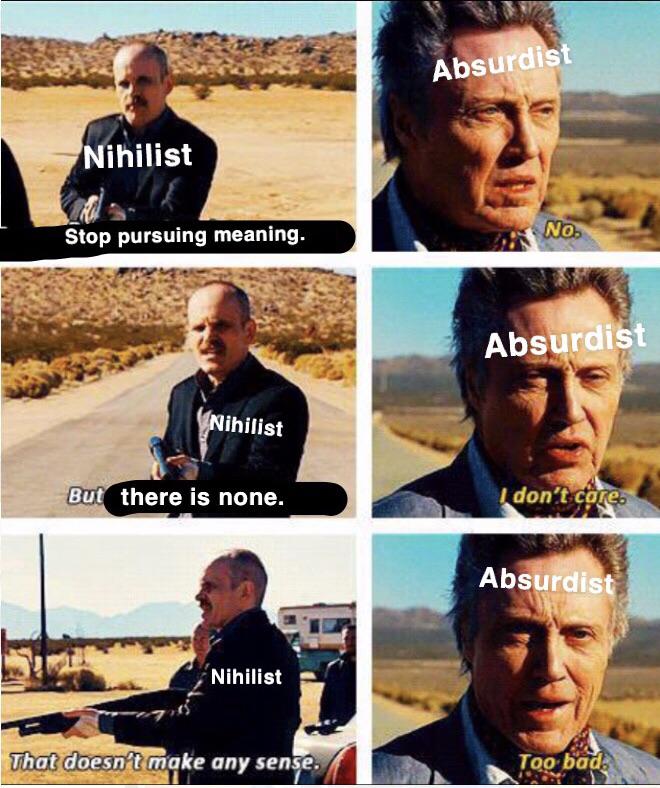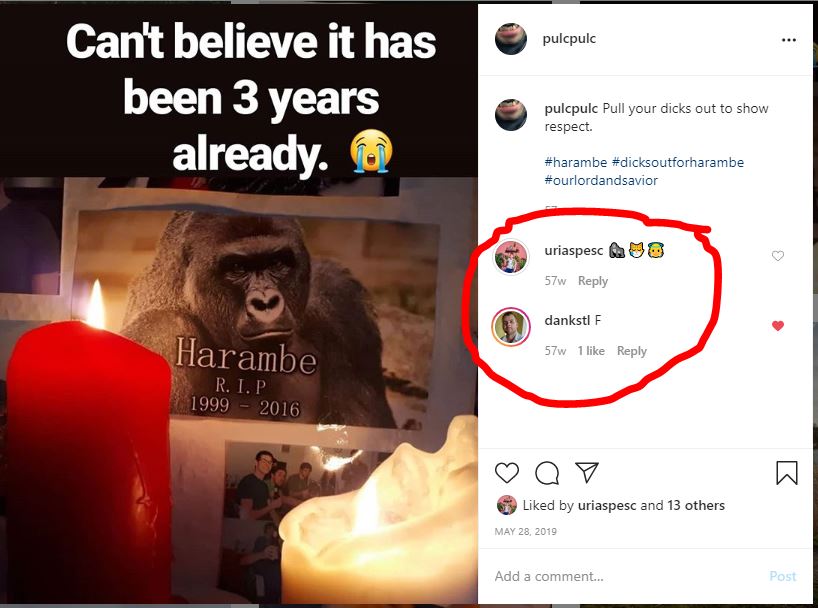Some days ago I transferred money to an acquaintance of mine. As the advice for the beneficiary, I wrote “Harambe died for our sins”.
Later, I got asked why I would care about the gorilla that much. I answered that I didn’t care about the gorilla that much but it was fun to pretend I cared. He did not understand me. I got asked several more questions regarding the topic and I just could not explain them to my satisfaction. Hereby I present you an article that should answer the question: “Why are Harambe memes funny?” I will attempt to explain the general functionality of memes and my personal philosophical approach to life and memes.
Disclaimer: I do not have a good knowledge of philosophy and I did not read any papers dealing with the social-cultural influence of memes. If you are looking for a scientific article loaded with references, read something else. This short article is full of assumptions and my reflections on the communities revolving around memes and my personal experience.
So why is Harambe meme funny? First of all, I do not think Harambe is anyhow a special meme. It evolved just like every other meme: it was semi-randomly picked, went viral, and organically developed itself into what it is now. It could have been any other animal shot in the zoo if there was a video recording of the incident.
One could argue that assuming that Harambe is replaceable with an arbitrary animal, we would have to explain why memes are funny in general. I will attempt that but focusing only on abstract (dank) Harambe-like memes. I personally consider the meme as one of the memes that are not entirely shallow as - in order to get it understood - it requires at least some prior background knowledge of the incident.
Memes serve the purpose of entertainment, the most viral ones being humorous. However, they represent much more. The picture of Harambe is not funny at all without context (the knowledge of what it represents) as the shooting of the gorilla itself is in fact a very sad incident.
Origin If you want to know more about the Harambe meme, visit knowyourmeme.com. Long story short: It started as mocking the ones who genuinely wanted “justice for Harambe”, e.g. holding the parents accountable for Harambe’s death complemented with death threats. This led, for example, to memes comparing the significance of Harambe to dead celebrities.

As said before, memes are mostly supposed to be funny. It does not have to be always the case but usually, you giggle a bit or you let some air out of your nose, switching back to the usual face of boredom.

However, expressions like “Harambe died for our sins.” rarely make their way into mainstream memes. Without further ado, I extracted two main reasons why “Harambe died for our sins.” is funny and I will try to back it up with simplified philosphical concepts based on my experience using simple English vocabulary.
Community Aspect
In order to explain the first reason, let’s briefly review where memes appear in the example of their life cycle. A meme usually originates at 4chan or Twitter and goes to Reddit. When it reaches the top, it goes to the more mainstream meme platforms like 9gag, eventually reaching Instagram or boomers on Facebook. All these platforms partially serve as a community.
Just like other communities, let’s say Urban Sketchers, Football Fans, or Beliebers (Justin Bieber fans - the more you know), meme platforms collect like-minded people. These communities have their sets of rules making the communities unique.
As a (non-proud) 9gagger, I will briefly explain the 9gag community aspect. (side note: I grew up with 9gag just like many other millennials and nerds around my age. I am aware of the slot-machine like mechanism damaging my brain that is desperately looking for stimulants, consuming funny cat videos instead of Camus’ Myth of Sisyphus) The rules of 9gag are, for instance, posting a potato picture after a long post, no use of emojis nor Comic Sans. If you post a photo, put a banana for scale. Knowing the rules creates a bond among the members of the community, just like knowing the rules of football connects football fans.
If I write “Harambe died for our sins” or post a Harambe-related picture, the 9gag community members (or anyone acquainted with the message) would understand it and possibly giggle a bit. It is in human nature to show that one understands what the author meant. Just like in the screenshot taken from my Instagram account, people comment “F” or sad emojis, demonstrating their belonging to the community. Humans are social beings and they need to belong That is the key factor of memes (and jokes in general I guess).
In the world of football fans, they can connect over shared knowledge about football (duh). I copied a joke from inews.co.uk: “Three hours of football and the goalkeeper is still England’s top scorer.” I would think it evokes the same amount of giggle among English football fans as ” Harambe died for our sins” among meme fans and it’s incomprehensible without context.
A further aspect connected to it is the feeling of exclusivity. I would assume that a good knowledge of memes is perceived positive (not sure though, depends on the social environment). Therefore, posting something that the others (normies) don’t know about makes the authors feel good.
In case you own your nerdiness, it is also a good starter for a conversation. It is not a difficult concept to grasp as sharing knowledge makes for a good community. Communities like 9gag are an internet equivalent of “real-life” communities.
Philosophical Aspect
Let me now write about the psychological aspect of the significance of Harambe in my life. This is just my personal approach and I do not think it’s generally applicable, although I do believe this approach is partially represented by people from communities like 9gag or even by millennials/generation Z in general, without naming or realizing it.
Nihilism
I think the fight against depression is one of the greatest challenges in modern society. In my observation, (existential) nihilism is one of the decisive sources of both getting and keeping depression. With atheism on the rise and the decreasing trend of spirituality, one can start to ask whether the life and the living itself makes any sense at all. Nihilism definitely grows and especially young people are drawn to it.
You can find many definitions and subcategories of nihilism. I understand nihilism a “belief that life has no intrinsic value or meaning”. I am quoting this from Rory Biggs O’May’s article.
Now, I do not say nihilism itself is bad, nor that nihilism causes depression, even though the term is sometimes used interchangeably. Nihilism is much more of a starting point for further philosophies, discussions or life approaches. Even the brilliant kurzgesagt made a nice video about optimistic nihilism.
However, I observe a lot of people tend to deal with nihilism in the wrong way. The obvious one being the following implication: “If life has no meaning, non of my actions have meaning, hence nothing at all matters.”, which definitely indicates depression.
Nihilism, however, does not have to be the cause of depression but it is often the outcome of depression. The problem is that if depressed people stumble upon nihilism, it will make all the sense in the world to them and they will accept it as their philosophical view of the universe. “It legitimizes their feeling that nothing matters and so it ingrained itself in their minds.” as brilliantly expressed in an article by Tomas.
Unfortunately, I also “chose” this way of handling it in the past. I am not sure, whether the “If life has no meaning, none of my actions have meaning, hence nothing at all matters.” partially caused my depression or if it was just a validation of my depressive state. But it doesn’t matter.
Ok, there have been a few paragraphs with no mention of Harambe. You might be asking, why all the nihilism and depression stuff is relevant for Harambe memes? (Ok, I seriously doubt anyone would ever read this far.) The answer is, among consumers of memes such as 9gag users, there is a big prevalence of both depression and nihilism. I have no data backing up this statement but you can just visit the comment sections. Posts like this one appear on 9gag a lot.
Absurdism
The answer is: I believe the (dank) memes are a side product of the philosophy of absurdism, that emerged out of nihilism. It sounds complicated but in fact, it is not, let me explain.
At first, let’s briefly summarize what are the answers for nihilism that philosophy offers. I am using here the excellent summary and a picture from Florian Blümm from Quora on it.
Nihilism offers no answer on how to solve the void of no objective meaning in life.
Existentialists like Jean-Paul Sartre admit that there is no objective meaning in life. Nevertheless, every person can and should find subjective meaning in life.
“Another reaction to nihilism is absurdism. Absurdists like Albert Camus accept the absurd contradiction between the person looking for meaning and a senseless world. Everyone can be free and happy if they only want to.” Camus also describes further reactions to nihilism which are: Suicide, Religion or spirituality, and Rationalism.
I spent a lot of time thinking about all the offered reactions as a solution to the void and the scary state of nihilism and demotivation. I have a repulsion against religion and I just could not start to believe (and frankly, I made almost zero effort). I thought about suicide but it felt too radical and it would be irreversible. I was making thoughts about existentialism for a very long time, however, it always failed on the contradiction of looking for a sense in a senseless world. Firstly, finding a subjective sense is difficult, and secondly, the contradiction can lead to a vicious circle of searching without finding it. And I feel like and observe, there are a lot of people trapped in this circle still looking for answers.
I chose absurdism as the escape route from the void of nihilism. And I would recommend it for everyone as it is rather liberating and makes life so much easier. (side note: I can totally understand if you wouldn’t take any advice from me.)
What is absurdism and how is it connected to Harambe memes?
A great insight into absurdism offers a video from BBC Ideas on YouTube. On the question of “What is the meaning of life”?, absurdism answers, there isn’t any.
- No meaning.
- No point.
- No worries.

Life is pointless, existence is meaningless and look at this Harambe picture!
As life has no meaning at all, do whatever you want to do, think whatever you want to and have fun. Do whatever makes you feel good (possibly sustainably). If the picture of Harambe entertains you right now, let yourself get entertained. The influence of absurdism has been strong in the arts. And memes are the art of modern ways. The picture of Whistler’s Mother is not fun. Mr. Bean’s cover of Whistler’s Mother is a lot of fun!
In my opinion and according to my perspective, dank memes like Harambe are the absurdist answer to nihilism. Together with the growth of nihilism, so are dank memes on growth. Among the younger audience like me, shows dealing with absurdism and existentialism like Rick and Morty or Bojack Horseman (my very favorite show) are very successful. If even life has no objective meaning, let’s not search for a meaning behind everything, let’s search for the interesting and bizarre!
Harambe memes are fun because they are absurd. They are unexpected. They are partially the alternative to a search for meaning (of life).
At this point, I would like to share the video of Veggietales predicting the future of humor and the internet. Considering the video is from 2003, it is incredibly accurate.
It absolutely reflects the abstract humor of memes like Harambe. The comment section under the video just confirms it as people (including me) find the “weed eater” punchline unironically funny.
Up to some extent, I can consider the picture of Harambe I framed in my room as an equivalent of a Jesus picture by religious people. Each time they look at the picture, they see the meaning behind it, they have a connection to the person represented in the picture and it moves them emotionally. If I look at the framed Harambe picture in my room, I can choose from a variety of emotions. I feel entertained each time looking at the picture due to the fact of how absurd it is. But at the same time, I can become mournful because of his death. In the meme culture, Harambe is often referred to as “Our Lord and Savior”. Even though it’s not serious, it’s completely the same principle, having the picture in my room and lighting candles during his death anniversary. It creates an emotion that the perceiver was looking for.
Determinism
I have the last (and the weakest) argument for my explanation of why Harambe memes are funny. This one is not very serious and it’s connected to absurdism.
Just like with the introduction to nihilism, I will make a statement out of nowhere: One of the problems (not only) the youth is dealing with is Determinism. By Wikipedia’s definition, “Determinism is the philosophical view that all events are determined completely by previously existing causes.” The opposite of determinism is randomness and the rival conception is free will.
During my “dark times”, I justified inaction by causal determinism, as similarly explained in the previous point about nihilism. I adopted the deterministic view saying that humans are merely the product of their biology and environment and therefore, free will is inherently an illusion. This obviously led to fatalism and the consequent attitude of resignation. Justifying depression with fatalism is basically the same as coping with nihilism with the overused quote “If life has no meaning, none of my actions have meaning, hence nothing at all matters” - it’s really self-destructive.
It doesn’t matter what is your position regarding the Determinism/ Free Will debate. What matters is the relevance of the outcome for you. What I do believe is that one should either not participate in the debate or take the free will position because Determinism, again, can lead to fatalism causing depression and self-deceit, especially when you are prone to it.
As the opposite of determinism is randomness, memes and especially the abstract (dank) memes are the execution of randomness and free will. Just like Veggietales predicted, it’s the random (“randonmly generated”) humor taking over nowadays. And it’s just my theory that Weedeater or some dank Harambe memes are funny not only because they are nonsensical but they also serve as the defense against fatalism.
Simulation Hypothesis
I came across the Simulation Hypothesis while reading about Determinism.
Just like we don’t know whether God exists or doesn’t, we don’t know if our world could be in fact an artificial simulation. This problem is called Simulation Hypothesis and many scientists and philosophers take the subject seriously.
I don’t believe there is God and I doubt that we are a part of a simulation. But neither is provable and it probably never will be. However, I am open to it and I find this topic thrilling. And most importantly, I have a lot of fun thinking about it.
And because having fun and being happy is my goal, I enjoy pretending that life is in fact a simulation. Or it’s possibly just my justification for doing silly stuff.
Do you remember “M. Night Shaym-Aliens!” episode of Rick and Morty, where Rick is caught in a simulation created by Zigerians and tries to mess up the CPU of Zigerians? I like to think of the possibility of a simulation for our world. Doing the unpredictable, unexpected, and random could mess up with the simulation. I know it doesn’t make much sense as in the case of simulation, my consciousness would be probably simulated as well, and therefore, I wouldn’t mess up anything. However, I can offer you a parallel: just like the infamous Jordan Peterson does not believe in God but acts like there is one - and I do the same with the Simulation Hypothesis. With the difference, that I am doing it just for fun and it corresponds with my absurdist approach. For me, it’s really nothing serious, just a fun aspect to ponder.
It’s fun to pretend Harambe is the Lord and Saviour. It’s fun to pretend that our world is an artificial simulation (and this can be possibly true, in contrast to Harambe). If our world is deterministic, it would create an absurd situation where even human consciousness is simulated and me writing this article could have been programmed by a computer. For my well being, the best answer is the absurdist approach: It doesn’t matter.
In the end, I feel like Harambe was just a leitmotif for my thoughts regarding my philosophical beliefs and opinions and it probably doesn’t even fit in them that much. You can consider it as a little bit of a clickbait as I don’t think Harambe and dank memes are that sufficiently connected to what I wrote.
Maybe it’s not a deep topic at all and in this article, I am just attempting to justify my inclination towards the absurd by philosophy using fancy terms. When I talked to my brother and asked him about Harambe, he replied that “it’s funny that you still keep it going”. I guess that sums it up pretty well.
Again, I have to admit (as mentioned in the intro), I’m not very knowledgeable about psychology, I started as a typical philosophy wannabee with Jordan Peterson’s videos, questioning whether to like the guy or not. (hint: not anymore). Feel free to correct me if I misinterpreted any information.
Summary
Without context, Harambe memes are not funny.
Harambe (or any other memes) make one feel as a part of a community and with enough knowledge they are entertaining.
If Harambe memes are rooted in philosophy, it is IMO absurdism.
However, each point I mentioned in the article leads to “it’s funny because it’s entertaining”. I also think I wrote more about my views and opinions with some foundation in my amateur interpretation of philosophy. I guess it’s difficult to explain one’s humor.
My advice and what you can take from this article
(The clickbait title actually includes a serious message for you, the readers. But feel free to stop reading now as it’s irrelevant for the title and probably irrelevant to most of you.)
In my opinion, it’s rather self-destructive to search for a meaning in life as it often just justifies inaction, especially if you just browse the Internet for your research. If you are depressed, please seek help and talk to your friends about it and don’t spend too much time browsing memes or psychology forums.
Harambe meme is fun just for me and people who know the context (duh). It’s just fun to refer to it all the time. In my life, I am using the absurdist approach - I do stuff that I like, what makes me feel good, and don’t seek any inherent value. Therefore, I enjoy pretending that our world might be an artificial simulation and I justify my absurdist approach by doing silly and (pseudo)random stuff. And it makes me happy, which has the highest importance for me and my wellbeing.
Do not dive into the debate about the meaning of life, do not dive into the determinism/ free will debate and do not overanalyze yourself. It’s time-consuming and it might harm you. Of course, not necessarily, I know people claiming Nietzsche turned their life around towards happiness. If you are feeling fine, you don’t need any of it and continue what you are doing. In general, reading books is better than Internet forums (duh).
Anyways, this article cost me a lot of time and it definitely was not worth it. I should have done something else instead. I was forced to reconsider some of my values as after writing them down, I found a lot of contradictions. And you should have done something else instead of reading it. If you read this far, I am sorry?


